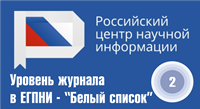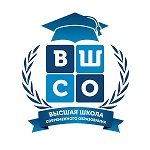ИНТЕГРАТИВНАЯ СЕМАНТИЧЕСКАЯ КАРТА КАК ИЛЛЮСТРАТИВНО-СХЕМАТИЧЕСКАЯ ОСНОВА РАЗВИТИЯ ПРОФЕССИОНАЛЬНО ЗНАЧИМОГО АНГЛОЯЗЫЧНОГО ТЕЗАУРУСА ТЕМАТИЧЕСКОГО ПОЛЯ “LAW”
Аннотация
В статье рассматривается семантическая карта интегративного типа как иллюстративно-схематическая основа развития у студентов юридических специальностей профессионально ориентированного англоязычного тезауруса тематического поля “Law”. Целью исследования является разработка алгоритма формирования профессиональной межкультурной компетенции обучаемых на базе разработанного комплекса коммуникативно-ориентированных лексико-грамматических и дискуссионных заданий с привлечением интегративной ментальной карты, позволяющей им обеспечить выполнение прагматических и профессиональных коммуникативных задач в моделируемых ситуациях вступления в правовые отношения.
Методология. Методологической основой исследования являются когнитивные и обобщающие методы, такие как теоретический анализ исследовательских работ в области лингводидактики, педагогики, когнитивной лингвистики, а также прогностические методы. Материалом исследования послужил учебно-методический комплекс по дисциплине “Английский язык в сфере юриспруденции”, используемый в рамках программы бакалавриата 40.03.01 “Юриспруденция”.
Результаты. В статье анализируется алгоритм развития умений и навыков лингвокогнитивной обработки англоязычных юридических текстов статического характера (для студентов уровней intermediate и upper-intermediate) и англоязычных видеороликов динамического характера жанра “Courtroom Drama” (для студентов уровня Advanced) с использованием интегративных семантических карт. Анализ особенностей их применения позволяет подчеркнуть их основную функцию, которая заключается в оптимизации освоения информации о правоприменении и судопроизводстве в англоязычных странах, необходимой для эффективной межкультурной коммуникации будущих практиков различных отраслей права.
Вывод. Формирование и развитие англоязычного тезауруса профессионального юриста является одним из важных направлений современной лингводидактики. Доказано, что оптимизация этого процесса стала возможной благодаря использованию новых технологий обучения, в частности, интегративного семантического картирования как инструмента вербализации полученных знаний, позволяющего осознанно применять когнитивно усвоенную информацию, грамотно вербализовать ее в межкультурном профессиональном общении, предотвращая и устраняя возможные коммуникативные сбои.
Скачивания
Литература
References
Iskandarova O.Y. Inoyazychnaya professional’naya kompetentnost’ [Foreign Professional Competence]. Vysshee obrazovanie v Rossii [Higher Education in Russia], Moscow, 1999, no. 6, pp. 53-54.
Kochetkova S.Y. Formirovanie inoyazychnogo professional’no znachimogo tezaurusa u studentov–nefilologov na osnove metoda semanticheskogo kartirovaniya (na materiale angliyskogo yazyka) [The Formation of Professionally Significant Foreign Language Thesaurus of Students-Non-philologists (Based on the Material in the English Language)]. PhD dissertation. Volgograd, 2006, 221 p.
Makar L.V. Obuchenie professional’no-orientirovannomu obshcheniyu na anglijskom yazyke studentov neyazykovogo vuza [Teaching Professionally Oriented Communication in English to Students of a Non-Linguistic University]. Abstract of PhD dissertation. St. Petersburg, 2000, 21 p.
Makarova E.L. Obuchenie sredstvam metakommunikaсii v argumentiruyushchem diskurse (nemeckij yazyk) [Teaching Metacommunication Tools in Argumentative Discourse (German)]. PhD dissertation. Moscow, 1994, 311 p.
Makarova E.L. Rol’ sredstv metakommunikacii v rechevom argumentirovanii na inostrannom yazyke [The Role of Metacommunication Tools in Speech Argumentation in a Foreign Language]. Variativnost’ v obuchenii inostrannym yazykam v neyazykovom vuze. [Variability in Teaching Foreign Languages in a Non–Linguistic University]. Moscow, 1996, pp. 76-83.
Mitryuhina I.N. Tekhnologiya mind-mapping kak informacionnaya osnova pri obuchenii monologicheskomu inoyazychnomu govoreniyu v usloviyah cifrovoj sredy [Mind-mapping Technology as an Information Basis for Teaching Monological Foreign Language Speaking in a Digital Environment]. Vestnik PNIPU. Problemy yazykoznaniya i pedagogiki [Bulletin of PNIPU. Problems of Linguistics and Pedagogy]. 2021, no. 2, pp. 150-162.
Putilina E.A., Uskova E.O. Inoyazychnyj professional’nyj tezaurus specialista ekonomiko-pravovoj sfery kak problema lingvodidaktiki [A Foreign Language Professional Thesaurus of a Specialist in the Economic and Legal Sphere as a Problem of Linguodidactics]. Vestnik PNIPU. Problemy yazykoznaniya i pedagogiki [Bulletin of PNRPU. Problems of Linguistics and Pedagogy]. 2018, no. 3, pp. 175-187.
Trunova N.V. Sredstva formirovaniya kommunikativnoj kompetencii na urokah inostrannogo yazyka [The Means of Forming Communicative Competence in Foreign Language Lessons]. Metodika prepodavaniya inostrannyh yazykov [Methods of Teaching Foreign Languages]. Borisoglebsk: BPU Publ., 2003, pp. 56-62.
Shchekoldina A.V. Interaktivnost kak neotyemlemyj komponent diskussii i rezultat sformirovannosti diskussionnyh umenij [Interactivity as an Integral Component of Discussion and the Result of the Formation of Discussion Skills]. Aktualnye problemy lingvistiki i mezhkulturnoj kommunikacii: materialy nauch. sessii fak. lingvistiki i mezhkulturnoj kommunikacii VolGU [Actual Problems of Linguistics and Intercultural Communication: Materials of Scientific Research Session of the Faculty of Linguistics and Intercultural Communication of Volgograd State University]. Volgograd, 2005, no. 3, pp. 333-338.
Buzan T. How To Mind a Map. URL: https://www.buzangroup.com (accessed October 11, 2021)
Buzan T. Mental Maps: Method, Structure, Intellect. URL: https://www.tonybuzan.com (accessed October 11, 2021)
Downs R.M., Stea D. Maps in Minds. Reflections on Cognitive Mapping. NY, 1977, 308 p.
Hartl A. Kognitive Karten und kognitives Kartieren. Repräsentation und Verarbeitung räumlichen Wissens. Berlin, 1990, pp. 34-46.
Portugali J. The Construction of Cognitive Maps. Dortrecht, 1996, 450 p.
Redtenbacher C. Kognitive Karten im Spielfilm. Cognitive Maps und Medien. Formen mentaler Repräsentation bei der Medienwahrnehmung. Frankfurt/M.: Lang Verlag, 1996, pp. 15-72.
Список литературы
Искандарова О.Ю. Иноязычная профессиональная компетентность // Высшее образование в России. 1999. № 6. С. 53-54.
Кочеткова С.Ю. Формирование иноязычного профессионально значимого тезауруса у студентов-нефилологов на основе метода семантического картирования: (на материале английского языка): Дис. ... канд. пед. наук. Волгоград, 2006. 221 с.
Макар Л.В. Обучение профессионально-ориентированному общению на английском языке студентов неязыкового вуза: Автореф. дисс. … канд. пед. наук. СПб., 2000. 21 с.
Макарова Е.Л. Обучение средствам метакоммуникации в аргументирующем дискурсе (нем. язык): Дисс. … канд. пед. наук. М., 1994. 311 с.
Макарова Е.Л. Роль средств метакоммуникации в речевом аргументировании на иностранном языке // Вариативность в обучении иностранным языкам в неязыковом вузе. М., 1996. С. 76-83.
Митрюхина И. Н. Технология mind-mapping как информационная основа при обучении монологическому иноязычному говорению в условиях цифровой среды // Вестник PNIPU. Проблемы языкознания и педагогики. 2021. № 2. С. 150-162.
Путилина Е.А., Ускова Е.О. Иноязычный профессиональный тезаурус специалиста экономико-правовой сферы как проблема лингводидактики // Вестник PNIPU. Проблемы языкознания и педагогики. 2018. № 3. С. 175-187
Трунова Н.В. Средства формирования коммуникативной компетенции на уроках иностранного языка // Методика преподавания иностранных языков.: Сб. науч. тр. Борисоглебск: Изд-во БПУ, 2003. С. 56-62
Щеколдина А.В. Интерактивность как неотъемлемый компонент дискуссии и результат сформированности дискуссионных умений // Актуальные проблемы лингвистики и межкультурной коммуникации: Материалы научной сессии факультета лингвистики и межкультурной коммуникации ВолГУ. Вып. 3. Волгоград: Изд-во ВолГУ, 2005. С. 333-338.
Buzan T. How To Mind a Map. URL: https://www.buzangroup.com (дата обращения: 11.10. 2021)
Buzan T. Mental Maps: Method, Structure, Intellect. URL: https://www.tonybuzan.com (дата обращения: 11.10. 2021)
Downs R.M., Stea D. Maps in Minds. Reflections on Cognitive Mapping. NY, 1977, 308 p.
Hartl A. Kognitive Karten und kognitives Kartieren // Repräsentation und Verarbeitung räumlichen Wissens. Berlin, 1990, pp. 34-46.
Portugali J. The Construction of Cognitive Maps. Dortrecht, 1996, 450 p.
Redtenbacher C. Kognitive Karten im Spielfilm // Cognitive Maps und Medien. Formen mentaler Repräsentation bei der Medienwahrnehmung. Frankfurt/M.: Lang Verlag, 1996, pp. 15-72.
Просмотров аннотации: 249
Copyright (c) 2022 Svetlana Y. Kochetkova, Elena A. Kurchenkova

Это произведение доступно по лицензии Creative Commons «Attribution-NonCommercial-NoDerivatives» («Атрибуция — Некоммерческое использование — Без производных произведений») 4.0 Всемирная.





































